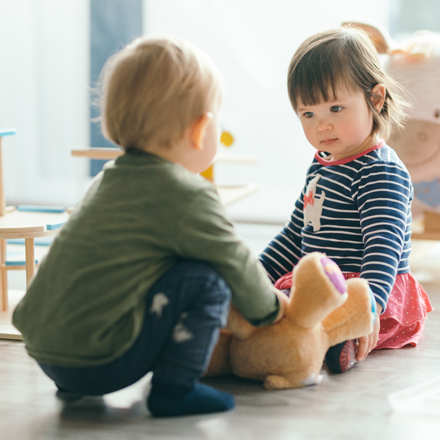Conflict Resolution
Parents are often eager to avoid “fighting” or “conflict” between toddlers. But Infant/Infant Interaction, or Play with Peers, is an important element of how children learn.
RIE classes are based on the awareness that even young infants enjoy and benefit from interactions with similar-aged peers. Classes stay together over time so the children come to know one another well. As friendships grow, the children get to play out a range of feelings and behaviors about being together. Shared interests sometimes lead to conflicts over space and objects. Young children can often resolve conflicts on their own; at RIE we learn to hold back before intervening, to observe first to see if we are needed.
A tug-of-war over a toy is how toddlers learn to handle conflict. The child who has had a toy taken gets to feel what that is like. Maybe she is upset. Maybe not. And the child who has taken the toy gets to experience experience the reaction of their playmate, and, in turn, have their own feelings about the situation. “How powerful am I? But…my friend is crying, how does that make me feel?” Sometimes, no intervention is needed. Both children continue their play without further ado.
If the conflict persists, we try to show our interest and concern by reflecting what we see. “I see you both want that toy. Steve, you want it. Jesse, you want it too.” By stating the problem without value judgments, we give both children the feeling that we understand them, that we are there for them.
Remaining calm is key, and remembering that toddlers are learning how to assert themselves while at the same time learning how to get along with others. All the time we are speaking to the one who took the toy, we are being kind to him or her. As Magda Gerber said, “We teach gentleness by being gentle.” At the same time we try to be equally calming with the one whose toy was taken, without overdoing our sympathy. We let him know we are sorry he’s unhappy, see that he is not hurt, and let him know he can hold on tight. Too much fussing and sympathy can keep a child from finding her or his own power.
Of course, if the conflict gets too physical, then intervention is required. At that point we would move close enough to prevent hitting or pushing and let the children know, in simple language, that hurting another person is not allowed. “I won’t let you hit Jesse.”
During Parent-Infant Guidance Classes, a RIE Facilitator models these guidelines of how to observe while allowing children to interact naturally, and when and how to engage to help children learn to respect each other. As with most important skills, everyone gets better with practice!


